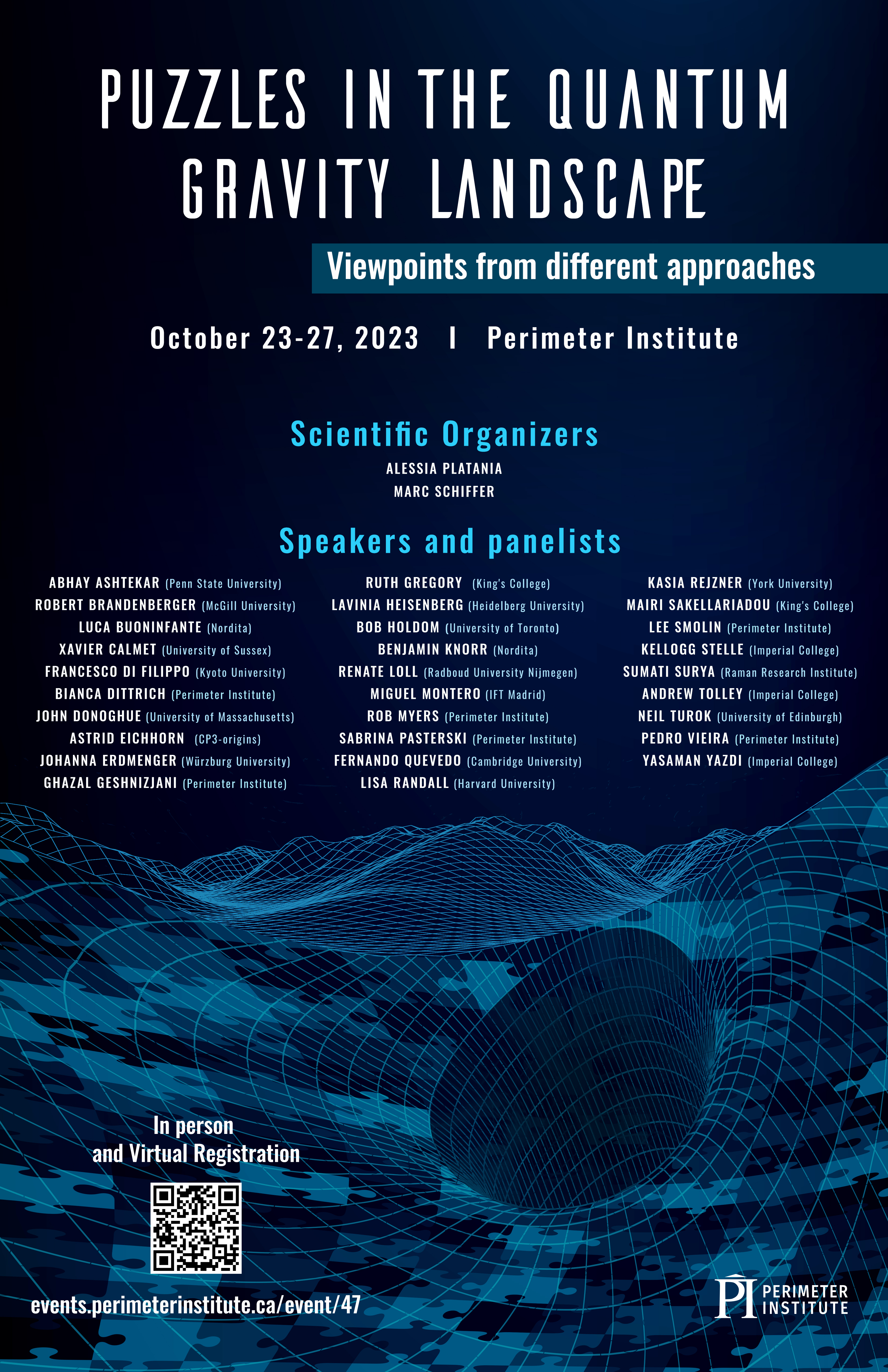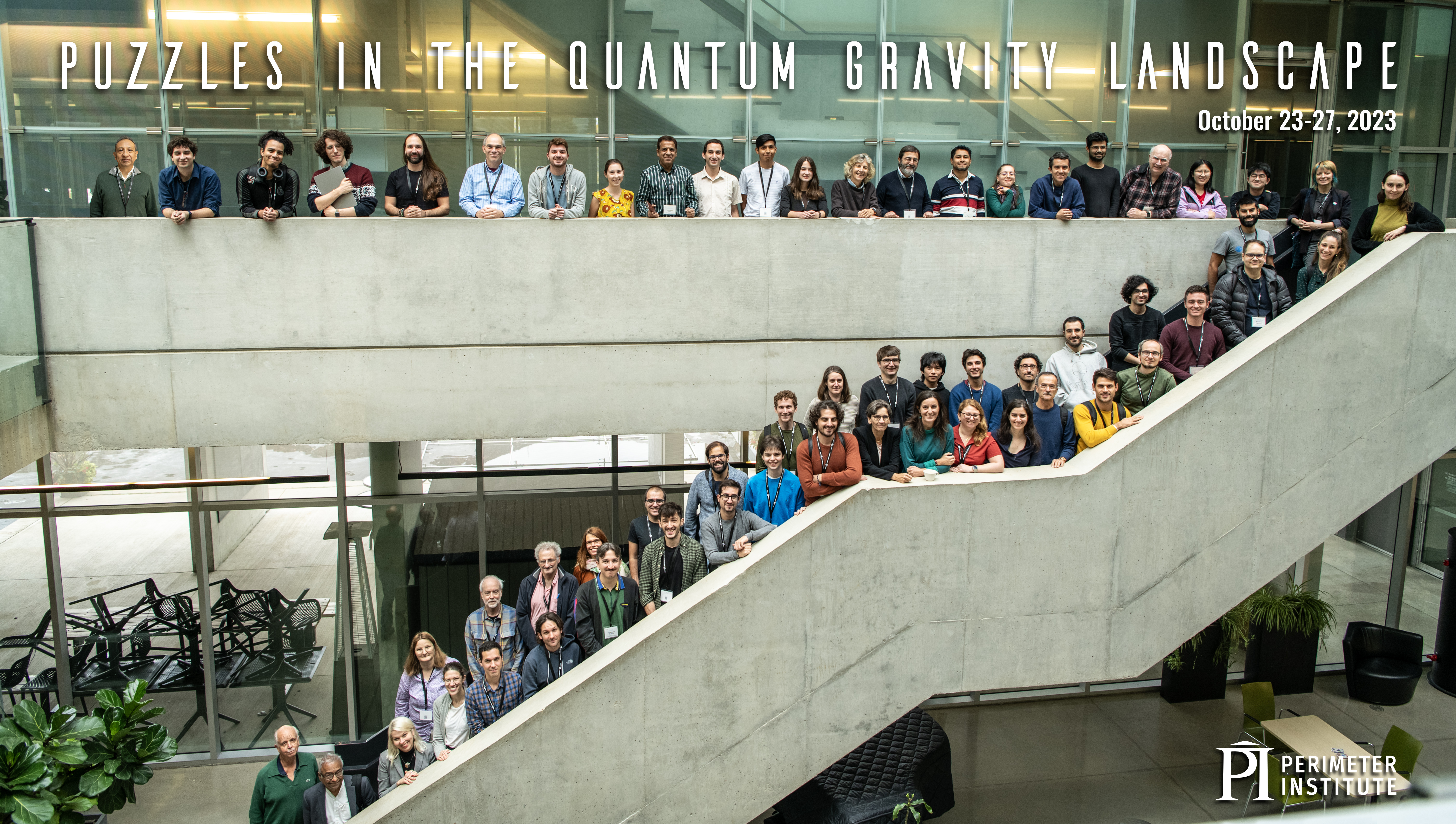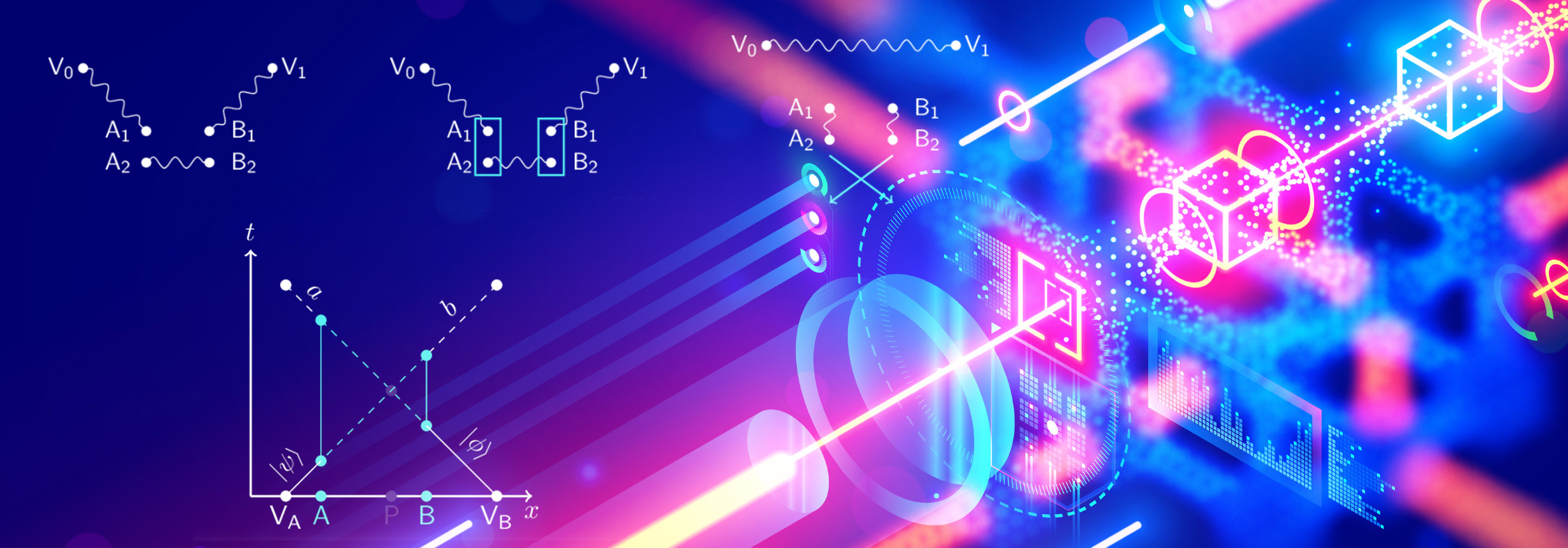Format results
-
Talk
-
-
O Painel de Fomento em Ciência, Tecnologia e Inovação do CNPq e suas contribuições para a pluralidade na ciência
Maria Lucia de Santana Braga -
-
-
-
-
As barreiras e a sub-representação negra na docência do Ensino Superior Brasileiro
Celso Lins de Oliveira -
-
-
Talk
-
-
-
-
-
Panel 2: Inclusion and diversity in science and technology: an initiative for equality and development.
Zélia Maria Da Costa Ludwig -
-
-
-
-
Talk
-
-
Talk
-
-
Talk
-
-
-
The rational use of resources to achieve sustainability.
Antonieta Rojas de Arias -
-
-
-
-
-
-
Talk
-
Lessons of the Effective Field Theory Treatment of General Relativity
John Donoghue University of Massachusetts Amherst
-
Positivity Bounds and Effective Fields Theories (A Review)
Andrew Tolley Imperial College London
-
Holography and its implications for quantum gravity - VIRTUAL
Johanna Erdmenger University of Würzburg
-
A hike through the Swamp
Miguel Mlontero IFT Madrid
-
Piecing Together a Flat Hologram
Sabrina Pasterski Perimeter Institute for Theoretical Physics
-
Open Discussion with today's speakers (Donoghue, Erdmenger, Montero, Pasterski, Tolley)
-
John Donoghue University of Massachusetts Amherst
-
Johanna Erdmenger University of Würzburg
-
Miguel Mlontero IFT Madrid
-
Sabrina Pasterski Perimeter Institute for Theoretical Physics
-
Andrew Tolley Imperial College London
-
-
Panel Discussion - Strengths and limitations of EFT (Donoghue, Knorr, Montero, Quevedo, Tolley)
-
John Donoghue University of Massachusetts Amherst
-
Miguel Mlontero IFT Madrid
-
Fernando Quevedo University of Cambridge
-
Carlo Rovelli Aix-Marseille University
-
Andrew Tolley Imperial College London
-
-
-
-
Talk
-
3pt functions: Yes Q's
Pedro Vieira Perimeter Institute for Theoretical Physics
-
An explicit solution
Paul Ryan King's College London
-
QSC definition in N=4
Paul Ryan King's College London
-
Q-functions in spin chains. QSC for spin chains
Paul Ryan King's College London
-
3pt function: No Q's
Pedro Vieira Perimeter Institute for Theoretical Physics
-
-
Talk
-
Talk
-
Classical Physics Lecture - 100323
Aldo Riello Perimeter Institute for Theoretical Physics
PIRSA:23090037 -
Classical Physics Lecture - 100223
Aldo Riello Perimeter Institute for Theoretical Physics
PIRSA:23100033 -
Classical Physics Lecture - 092723
Aldo Riello Perimeter Institute for Theoretical Physics
PIRSA:23090036 -
Classical Physics Lecture - 092623
PIRSA:23090097 -
Classical Physics Lecture - 092523
Aldo Riello Perimeter Institute for Theoretical Physics
PIRSA:23090035 -
Classical Physics Lecture - 092223
Aldo Riello Perimeter Institute for Theoretical Physics
PIRSA:23090034 -
Classical Physics Lecture - 092023
Aldo Riello Perimeter Institute for Theoretical Physics
PIRSA:23090033 -
Classical Physics Lecture - 091823
Aldo Riello Perimeter Institute for Theoretical Physics
PIRSA:23090032
-
-
Talk
-
Quantum Theory Lecture - 100323
-
Bindiya Arora Guru Nanak Dev University
-
Dan Wohns Perimeter Institute for Theoretical Physics
PIRSA:23090049 -
-
Quantum Theory Lecture - 100223
-
Bindiya Arora Guru Nanak Dev University
-
Dan Wohns Perimeter Institute for Theoretical Physics
PIRSA:23100034 -
-
Quantum Theory Lecture - 092723
-
Bindiya Arora Guru Nanak Dev University
-
Dan Wohns Perimeter Institute for Theoretical Physics
PIRSA:23090048 -
-
Quantum Theory Lecture - 092623
Dan Wohns Perimeter Institute for Theoretical Physics
PIRSA:23090098 -
Quantum Theory Lecture - 092523
-
Bindiya Arora Guru Nanak Dev University
-
Dan Wohns Perimeter Institute for Theoretical Physics
PIRSA:23090047 -
-
Quantum Theory Lecture - 092123
-
Bindiya Arora Guru Nanak Dev University
-
Dan Wohns Perimeter Institute for Theoretical Physics
PIRSA:23090046 -
-
Quantum Theory Lecture - 092023
-
Bindiya Arora Guru Nanak Dev University
-
Dan Wohns Perimeter Institute for Theoretical Physics
PIRSA:23090045 -
-
Quantum Theory Lecture - 091823
-
Bindiya Arora Guru Nanak Dev University
-
Dan Wohns Perimeter Institute for Theoretical Physics
PIRSA:23090044 -
-
-
Talk
-
-
Talk
-
-
QPV: An Overview and Reflections
Harry Buhrman Centrum Wiskunde & Informatica
-
Popescu-Rohrlich correlations imply efficient instantaneous nonlocal quantum computation
Anne Broadbent University of Ottawa
PIRSA:23090023 -
Non-local quantum computation meets quantum gravity
Alex May Perimeter Institute for Theoretical Physics
-
Quantum Error-Correction and Holographic Task
Beni Yoshida Perimeter Institute for Theoretical Physics
-
-
Protocols and Implementations of Quantum Position Verification
-
Eric Chitambar University of Illinois Urbana-Champaign
-
Paul Kwiat University of Illinois
-
-
-
-
Proposals to Boost STEM Participation in Underrepresented Groups
Proposals to Boost STEM Participation in Underrepresented Groups
-
Increasing Diversity and Inclusion in Science
Increasing Diversity and Inclusion in Science
-
Quantum Field Theory 1 2023/24
Quantum Field Theory 1 2023/24 -
-
School on Mathematical Modeling and Governance
School on Mathematical Modeling and Governance
-
Puzzles in the Quantum Gravity Landscape: viewpoints from different approaches
Unraveling the quantum nature of gravity is one of the most pressing problems of theoretical physics. Several ideas have been put forward and resulted in a number of theories of quantum gravity. While these theories have explored different facets of the “quantum gravity landscape”, all viable approaches should ultimately make contact with observations, and answer exciting questions in cosmology and black-hole physics.
Sharing knowledge, exchanging ideas, and building a dictionary between different theories are crucial steps toward answering these questions, efficiently contrasting different theories, and ultimately reaching a deeper understanding of our Universe.
This conference will contribute to these goals by bringing together leading experts in different approaches to quantum gravity, gravitational effective field theory, black-hole physics, and cosmology. We will focus on specific puzzles in quantum gravity and their resolutions within different approaches. The conference will be highly interactive, with plenty of time to discuss common problems, understand the big picture, and develop novel connections between fields.Registration: Registration is now open, and both in-person and virtual participation is welcome. Online participants will be able to interact on an equal footing in question sessions and discussions. In-person attendance is limited and will be approved on a first-come, first-served basis. Talks are by invitation only, but in-person participants are encouraged to apply to present a poster.
Spam warning: There is an increasing number of scam agencies reaching out to conference speakers and attendees. Perimeter Institute does not use third-party agencies. We advise speakers and attendees to ignore emails and not to provide any details to anyone who is not from Perimeter Institute.
Confirmed Speakers and Panelists:
- Abhay Ashtekar (Penn State University)
- Robert Brandenberger (McGill University)
- Luca Buoninfante (Nordita)
- Xavier Calmet (University of Sussex)
- Francesco di Filippo (Kyoto University)
- Bianca Dittrich (Perimeter Institute)
- John Donoghue (University of Massachusetts)
- Astrid Eichhorn (CP3-origins)
- Johanna Erdmenger (Würzburg University)
- Ghazal Geshnizjani (Perimeter Institute)
- Ruth Gregory (King's College)
- Lavinia Heisenberg (Heidelberg University)
- Bob Holdom (University of Toronto)
- Benjamin Knorr (Nordita)
- Renate Loll (Radboud University Nijmegen)
- Miguel Montero (IFT Madrid)
- Rob Myers (Perimeter Institute)
- Sabrina Pasterski (Perimeter Institute)
- Fernando Quevedo (Cambridge University)
- Lisa Randall (Harvard University)
- Kasia Rejzner (York University)
- Mairi Sakellariadou (King's College)
- Lee Smolin (Perimeter Institute)
- Kellogg Stelle (Imperial College)
- Sumati Surya (Raman Research Institute)
- Andrew Tolley (Imperial College)
- Neil Turok (University of Edinburgh)
- Pedro Vieira (Perimeter Institute)
- Yasaman Yazdi (Imperial College)


Territorial Land Acknowledgement
Perimeter Institute acknowledges that it is situated on the traditional territory of the Anishinaabe, Haudenosaunee, and Neutral peoples.
Perimeter Institute is located on the Haldimand Tract. After the American Revolution, the tract was granted by the British to the Six Nations of the Grand River and the Mississaugas of the Credit First Nation as compensation for their role in the war and for the loss of their traditional lands in upstate New York. Of the 950,000 acres granted to the Haudenosaunee, less than 5 percent remains Six Nations land. Only 6,100 acres remain Mississaugas of the Credit land.
We thank the Anishinaabe, Haudenosaunee, and Neutral peoples for hosting us on their land.
-
Quantum Spectral Curve and Three Point Functions mini-course
In this mini-course we will describe some recent integrability developments in N=4 SYM. Pedro will start with some overview of three point functions in this theory. Paul will introduce the powerful Quantum Spectral Curve formalism describing the full planar spectrum of N=4 SYM starting with some elementary spin chain introduction. In this formalism, each operator in the theory is governed by a (set of) Q-function(s). In his last lecture Paul will walk us through an explicit example from beginning to end of a QSC solution. Pedro will then describe some explorations on three point correlation functions in this theory. The goal would be to have a machine where three Q-functions are given as input and a three-point function is spit out as output. We will describe where we are in this quest.
No Zoom link or hybrid participation available. Registration is not required.
-
Minicourse on Epidemic Modeling for Pandemic Preparedness and Prevention
Minicourse on Epidemic Modeling for Pandemic Preparedness and Prevention
-
-
-
Brazilian Workshop on Soft Matter
Brazilian Workshop on Soft Matter
-
QPV 2023: Advances in quantum position verification

Quantum position verification (QPV) schemes use the properties of quantum information and the relativistic signalling bound to verify the location of an object (sometimes called a “tag”) to distant observers in an environment that may contain would-be spoofers. The guarantee is based on the assumptions of the underlying security model; various theoretically and practically interesting security models have been proposed. The area is attracting increasing interest, with new theoretical developments in security analyses, emerging experimental studies of QPV systems, and recently discovered surprising and intriguing connections to topics in quantum gravity. A workshop on QPV will be held at the Perimeter Institute for Theoretical Physics.
The workshop will cover topics related to all aspects of QPV, including, but not limited to:
- Theoretical developments related to the security of QPV schemes, including development or refinement of security models, proofs of security within given models, tradeoffs between security and efficiency, and Experimental studies of QPV and theoretical work aimed at developing practical QPV schemes.
- QPV’s relationship to other cryptographic tasks and primitives.
- QPV’s relationship to holography and quantum gravity.

Territorial Land Acknowledgement
Perimeter Institute acknowledges that it is situated on the traditional territory of the Anishinaabe, Haudenosaunee, and Neutral peoples.
Perimeter Institute is located on the Haldimand Tract. After the American Revolution, the tract was granted by the British to the Six Nations of the Grand River and the Mississaugas of the Credit First Nation as compensation for their role in the war and for the loss of their traditional lands in upstate New York. Of the 950,000 acres granted to the Haudenosaunee, less than 5 percent remains Six Nations land. Only 6,100 acres remain Mississaugas of the Credit land.
We thank the Anishinaabe, Haudenosaunee, and Neutral peoples for hosting us on their land.

